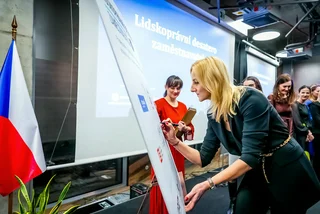The Prague University of Economics and Business (VŠE) has welcomed a record number of international students to its Bachelors and Masters programmes, it has announced. “Fortunately, we have not experienced any negative impact from the pandemic,” said Andrea Petránková from VŠE Public Relations. “In fact, our number of admissions from international students has increased again. As of September 2020, we now have a record number of 1,065 international students – a 19% increase on last year.”
This increase comes on the back of steady growth in the number of international full-degree students partaking in courses offered by the VŠE. Numbers have grown steadily since 2013, when the number of international full-degree students stood at only 338. However, the last pre-pandemic intake (September 2019) was 892, including students from almost 100 countries, and demand has continued to rise, despite the restrictions.
While all of the bachelor's and most of the master's programs have seen quite a large increase applicant, the Bachelor in Business Administration – a three-year undergraduate degree prepares graduates for the careers in corporate, financial and public institutions – has seen the largest surge in demand, up 29% from last year. The two-year Master’s in International Management (CEMS) has also experienced a significant 19% increase in applicants particularly from Russia, China, India, Germany and Kazakhstan.

Pandemic-related restrictions have paused face-to-face teaching for the moment, but it has had a welcome side effect of allowing students greater flexibility to engage with their studies. “Of course, because we are now completely online, students can study from anywhere,” said Vice-Rector for International Relations, Professor Jiří Hnilica. “Therefore, it was possible for many foreign students to study at VŠE, even though it was not possible to come to the country.”
Professor Hnilica cited the speed with which the VŠE adapted to e-learning as one of the keystones of its recent success: “The move online brought its advantages, such as great flexibility and increased digitisation, and our academic staff responded by acquiring new skills and developed innovative approaches to teaching online.”
Students have also reacted positively to the deployment of online learning. “Our staff quickly mobilized, and we hopped onto digital infrastructure very rapidly,” said Artem Fedorov, a first year Master of International Management student. “There are multiple channels to exchange files, organize group projects and communicate with the professors. As an international student, I appreciate the agility of academic staff when it comes to different time zones and restrictions some students face in different parts of the world.”
He acknowledged that the social aspect of university is currently diminished, but that students make an active effort to socialise virtually. “I stay in touch with my classmates and we actively organize virtual events to keep up the spirit in these challenging times,” he said.

Students are adapting well to the new reality, and are glad to be able to continue studying in such extraordinary circumstances. “Covid-19 has changed the whole world, including the way we are educated,” said Kübra Okumuş, a student in the Master’s of Finance and Accounting program.
“It was admirable that the university and the lecturers managed this transition so professionally, while we [students] were doubtful and worried about what it would be like.” Her fears proved baseless, and she was impressed by the outcome of the switch to online learning. She also praised the university staff, instructors, and coordinators who, she said, “were easily contacted and always ready to help.”
Ondřej Machek, Associate Professor in the Faculty of Business Administration, said that while it's obvious that many students are suffering due to the inability to meet in person, experience has shown that there are some clear benefits to remote learning. He has noticed an improved participation in lectures now that they’ve moved online, with more students actively taking part.
“Large-group lectures seem to be comfortable for many students, who do not hesitate to intervene” said Ondřej Machek, “in fact, I’m receiving more questions than during face-to-face lectures, and the online office hours also seem to be convenient for students.”
Some things remain constant, however, such as students’ grades. “The distribution of grades and the rate of success remains the same, whether the exams take place online or not,” said Ondřej Machek.
The success of VŠE in bringing its courses online and maintaining the active participation of its students is definitely a good news story to emerge from the pandemic. However, staff and students alike are keen on returning to the classroom. Despite the increased digitization of resources, the VŠE currently has no plans to make fully online teaching a permanent feature of its study programmes. “We would like to return to full-time in-person teaching,” pointed out Professor Hnilica, “because we see a huge advantage and strength in personal contacts.”
This will come as good news to prospective international students, who can look forward to spending time in the beautiful city of Prague, while earning a degree at VŠE.
This article was written in cooperation with the Prague University of Economics and Business (VŠE). The school is currently accepting applications for a number of its programs, for more information see here. Read more about our partner content policies here.












 Reading time: 4 minutes
Reading time: 4 minutes 






















